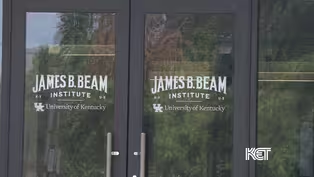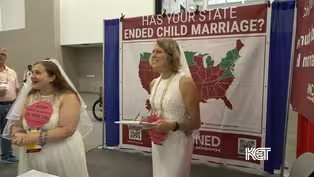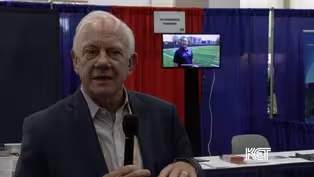
Kentucky Senator discusses A.I. at NCSL
Clip: Season 3 Episode 49 | 5m 45sVideo has Closed Captions
State Sen. Amanda Mays Bledsoe discusses A.I. at NCSL.
A forced marriage survivor says Kentucky has made progress in its child marriage laws, but argues more is needed.
Problems playing video? | Closed Captioning Feedback
Problems playing video? | Closed Captioning Feedback
Kentucky Edition is a local public television program presented by KET

Kentucky Senator discusses A.I. at NCSL
Clip: Season 3 Episode 49 | 5m 45sVideo has Closed Captions
A forced marriage survivor says Kentucky has made progress in its child marriage laws, but argues more is needed.
Problems playing video? | Closed Captioning Feedback
How to Watch Kentucky Edition
Kentucky Edition is available to stream on pbs.org and the free PBS App, available on iPhone, Apple TV, Android TV, Android smartphones, Amazon Fire TV, Amazon Fire Tablet, Roku, Samsung Smart TV, and Vizio.
Providing Support for PBS.org
Learn Moreabout PBS online sponsorshipadult man.
Just 7% were between 2 minors.
One of the prominent topics discussed at this year's summit in Louisville with the National Conference of State Legislatures was artificial intelligence from using AI to power state governments to building an AI ready workforce to the use of AI to misrepresent a political opponents campaign.
There was a lot of ground to cover Republican state and amaze Bledsoe of Lexington, Kentucky was one of the speakers discussing the technology.
I caught up with her on the last day of the summit yesterday.
and amaze Bledsoe from Lexington.
It's good to see you.
Thank you.
Thank you.
Nice to be saying, well, this conference has been tremendous.
This is the final day that we're speaking of it.
And you are right from the start of the gate.
>> We're already holding sessions about artificial intelligence and tell us what you talked about and what kind of questions people have about how to get the policy right in their states.
Sure.
We've we've actually had a number of AI sessions here at this at the TSA, which has been a lot of fun to go to.
They have different focuses.
So the one that did die that I did I campaigning in elections.
>> How do we think about deepfakes are preventing deepfakes are disclosing when someone uses AI to do a campaign video or speeches or grads are are images.
And so it was a there's a pretty good session just on that side of a I yeah, I can imagine.
Now we're in this very robust presidential election year.
And there are, of course, a lot of other races that are on ballots.
>> Across the country, Kentucky included.
So if there ever was a time to really talk about identifying what is a deep fake and what is not because you really can't tell the difference.
You really can't.
And so even our own legislation and a bill is sponsored last year.
So no one.
31, we had a disclosure on it.
But now what you're seeing is they're able to remove disclosure, somebody else, you know, screenshots that takes its closure off, reset it.
So that's the problem.
The technology no government does not.
It's not set up well to respond quickly.
We're not we're not for that.
If you have that child know the tech is moving way quicker.
The government legislation is going to regulations going to KET up into.
That's really the challenge I think is trying to find a way to KET voters informed, be authentic about what they're seeing knowing that it's true.
Yeah.
And also trying to be mindful of it is it could be really hard to regulate in a way that's responsive.
Well, and I think you make a really good point about you just spoke artificial intelligence in terms of campaigns, but it is multidimensional multi multi multi faceted.
I mean, in every aspect of our economy.
>> Artificial intelligence will have some type of presents.
No question the use of that.
Just a state government to think about how we might use it for customer relations are constituent services.
That's a really low risk area.
You could to find that the data, if you Here's what we wanted to put out.
You could probably do some really good.
>> You know, response of things for for the Commonwealth.
What health care job classification to talk about taxes.
You talk about how we might use it for energy policy year.
You know, decision-making policy.
That is a that is much higher risk is so I think on that continuum that even in state government, where is it appropriate to use you kind of go from low-risk to high-risk, right?
Let's lean in with low We can be in response to the innovative that do good things.
And let's be a little more mindful of the high risk and pull back a little bit.
Will it since I think Kentucky is being pretty intentional on even having that spectrum light out, right?
Because we know there's been legislation proposed in previous sessions dealing with this and kind of pulled back.
In supple, let's study it some more.
>> And have a task force that at the time were speaking.
He's going to meet the following week.
That's right.
So that seems very intentional.
Take may be small baby steps.
You don't want to necessarily be first, but you want to be right to try to do what?
No question.
And I think that the commonwealth that the teenagers who are using AI, they're going to be part of that world.
It's not coming is not going away, right?
I want to put the genie back in the How do we regulate how we protect kids?
How do we use it as a really mindful of its appropriate use and also regular light.
It's going to KET changing changing so quickly.
So yeah, the framework someone asked me este on the panel, do the background tech and I was like, no, my undergrad isn't philosophy.
No, not of it.
But this isn't this full conversation.
Yeah, it is a full staff.
Go one.
Where is it appropriate?
Why are we using it?
There is this who should be making the decisions on that?
Yes, that's really well.
I think we're trying to get more attention.
But the framework more than just trying to regulate tech.
Well, I think you make a really good point that you don't have to guess I have a tech background or have a legal background and a lot of ethical issues to sort through and not having bad philosophical background certainly allows.
You have critically think through why you're doing what you're doing.
So I'd for many people want to like, well, we're just a few months out for the next legislative session.
Do you anticipate there being legislation or just kind of building up on the task force and and maybe it's addressing like you said, the low-risk low hanging fruit is often we say and then graduating up as things unfold.
Bubbly.
But I'm more likely, I think where we would really like to have at least some guidance or policy framework that says here's how we're approaching the commonwealth, the state government to be regulating the private sector as a whole different right conversation.
But at least for state government PRI put some guardrails out.
Here's where it's appropriate load high medium risk and try to lean into that policy.
And then it's technical.
You know how we treat government officials are elected officials is different and how I treat to put private citizen so they have deep fake that maybe it gets them.
That's different.
Youth kids with pornography and they're so much time on that side of it.
So I think we'll probably do some tailored legislation.
And also, I think one of the things we're talking about, some of the legislators is what's already in law that you could just adapt to use some different words.
So you can cut this.
What are the president-elect in legislature law and then just add some of this piece to ride in creating a whole different, you know.
Video has Closed Captions
Clip: S3 Ep49 | 3m 17s | The James B. Beam Institute for Kentucky Spirits welcomed its first class of interns in May. (3m 17s)
Video has Closed Captions
Clip: S3 Ep49 | 2m 49s | Child marriage laws are discussed at NCSL. (2m 49s)
Former Coach Working to Make Youth Sports Safer
Video has Closed Captions
Clip: S3 Ep49 | 3m 19s | Coach Jack Crowe to adopt a program to train coaches to recognize the signs of a concussion. (3m 19s)
Video has Closed Captions
Clip: S3 Ep49 | 2m 59s | The Derby Museum sent NCSL attendees home with a piece of Louisville culture. (2m 59s)
Providing Support for PBS.org
Learn Moreabout PBS online sponsorship
- News and Public Affairs

Top journalists deliver compelling original analysis of the hour's headlines.

- News and Public Affairs

FRONTLINE is investigative journalism that questions, explains and changes our world.












Support for PBS provided by:
Kentucky Edition is a local public television program presented by KET



